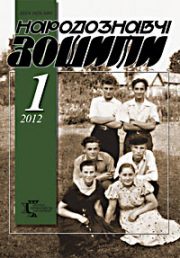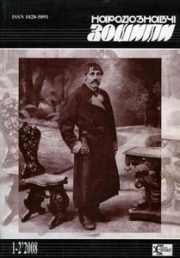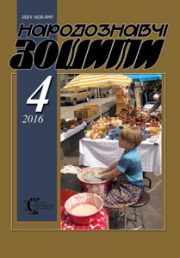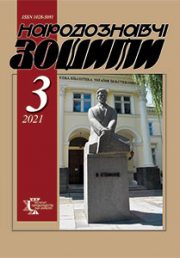The Ethnology Notebooks. 2020. № 3 (153), 738—745
UDK [392.3 + 392.91] (477.83/.84 + 477.86)
DOI https://doi.org/10.15407/nz2020.03.738
DENYS Iryna
ORCID ID: https://orcid.org/0000-0001-9646-2100
Candidate of Historical Sciences,
Associate Professor of the Department of Sociology and Cultural Studies of the
Ukrainian National Forestry University,
103 General Chuprynky Street, Lviv, 79057, Ukraine
Contacts: e-mail: idenys15@gmail.com
Abstract. This article deals with the problem of analysis of personal names in Gorodochchyna Lviv region on the basis of church baptism metrics (Artyshchiv, Mavkovychi, Cherlyany, Ugry, Stodilky, Bratkovychi, Halychany, Rodatychi, Andriyaniv, Livchytsi villages and Gorodok) in the middle of XIXth — at the beginning of XXIth centuries.
Since ancient times actual for Ukrainians is a question of correct choice of the name for a baby from the rich Ukrainian noun, in fact, our ancestors believed that the name determines the fate of man. In the different ethnographic regions of Ukraine there are many customs and traditions related to the choice and grant to the name of the new-born child. Therefore the aim of the article is to consider the names system of Gorodkivchan and investigate Ukrainian name traditions of the child on the territory of Gorodochchyna Lviv region on the materials of church christening birth-certificates (Artyshchiv, Mavkovychi, Cherlyany, Ugry, Stodilky, Bratkovychi, Halychany, Rodatychi, Andriyaniv, Livchytsi villages and Gorodok) from the middle of ХІХth — to the beginning of ХХІth centuries. Research methodology is based on the using of historical, systematic, scientific principles, authorial objectivity, as well as the application of features of comparative-historical, structural-functional, statistical, deductive methods, typological and complex analysis. The scientific novelty of work consists of the name’s system and child’s name traditions which are investigated for the first time in the Ukrainian historiography, ethnology, linguistics, ethno-linguistics on the territory of Gorodochchyna Lviv region in the middle of ХІХth — at the beginning of ХХІth centuries.
Generally known, that the proper name associated with magic and mystic rituals are certain, and a choice and grant of the human name were accompanied by corresponding customs and ceremonies characteristic for every locality of Ukraine. Ukrainians noun’s research, in particular Gorodkivchan, has both cognitive and applied value, because it informs about the deeper understanding of our human history, psychology, spiritual culture. The etymologic analysis of the nominal repertoire helps to expose cultural and historical copulas between ethnoss, methods of their cooperation. The detailed motivational analysis helps to understand changes that take place in the psychology of people and in aesthetic tastes. As known, the modern repertoire of the Ukrainians official names limits enough, and in some aspects even not quite rationed. The active enriching of nominal repertoire and its future normalization would take place far more successfully, if the using of new names relied on deep knowledge of our people’s names history in Ukraine, in particular in Western Ukraine.
Keywords: Gorodoсhchyna, personal name, church baptism metrics, motives of the child’s naming, folk believes, customs and traditions.
Received 10.02.2020
REFERENCES
Vykhovanets, I.R. (1990). The Mystery of Word. Kyiv: Rad. Sk. [in Ukrainian].
Hlynskyi, I. (1985). Your Name is Your Friend. Kyiv: Veselka [in Ukrainian].
Hrytsak, Ya. (2001). What Kind of Princes were the Capital in Kiev?: To construct the historical memory of Galician Ukrainians in the 1830—1930s. Ukraina moderna, 6, 77—95 [in Ukrainian].
Humetska, L.L. (1958). Essay on the Word-making System of the Ukrainian Language of the XIV—XV Centuries. Kyiv: Vyd-vo AN URSR [in Ukrainian].
Demchuk, M.O. (1988). Slavic Autochthonous Personal Names in the Life of Ukrainians of XIV—XV Centuries. Kyiv: Naukova dumka [in Ukrainian].
Kersta, R.Y. (1984). Ukrainian Anthroponymy of the XVI Century. Men’s Naming. Kyiv: Naukova dumka [in Ukrainian].
Kozholianko, H.K. (2001). Family-christened Ritual. Etnohrafiia Bukovyny: u 3 t. (Vol. 2, pp. 45—86). Chernivci: Zoloti lytavry [in Ukrainian].
Ostash, R.I. (1985). Turkic Elements in Ukrainian Anthroponymy. Ukrainska ta dialektna leksyka. (Pp. 124—137). Kyiv: Naukova dumka [in Ukrainian].
Pantsio, S.Ye. (1995). The Anthroponymy of Ancient Lemkivshchyna. Ternopil: Ternopil [in Ukrainian].
Simovych, V. (1929). Ukrainian Nouns of the Masculine Kind on -o in Historical Development and Illumination. Nauk. zb. Ukr. vys. pedah. in-tu im. M. Drahomanova u Prazi (Issue 1, pp. 305—369). Praha [in Ukrainian].
Skrypnyk, L.H. & Dziatkivska, N.P. (1996). Own Names of People: Dictionary-directory. Kyiv: Naukova dumka [in Ukrainian].
Khudash, M.L. (1977). From the History of Ukrainian Anthroponymy. Kyiv: Naukova dumka [in Ukrainian].
Chuchka, P.P. (1970). Anthroponymy of Transcarpathia (Introduction and Names). Uzhhorod [in Ukrainian].
Registration book of christening of parish of Greco-catholic Church of Christmas of Most Holy Our Lady Bratkovychi village (Lviv Arkhyieparkhiia, Horodok dekanat), 1995—2008 [in Ukrainian].
Registration book of christening of parish of Greco-catholic Church of Saint Martyr Paraskevii Uhry village (Lviv Arkhyieparkhiia, Horodok dekanat), 1996—2008 [in Ukrainian].
Registration book of christening of parish of Greco-catholic Church of Saint Martyr Paraskevii Uhry village (Lviv Arkhyieparkhiia, Horodok dekanat), 1983—1990 [in Ukrainian].
Registration book of christening, wedding ceremonies and funerals in the Saint Martyr Paraskevii Church Uhry village Horodotskoho blahochynnia, 1967—1976 [in Ukrainian].
The Metric of the Born and Baptized — Liber natorum et baptisatorum — the Temple of the Annunciation of the Blessed Virgin Mary, Gorodok (Lviv Archeparchy), 1953—1970 [in Ukrainian].
The birth-certificate of born and baptize of the Temple of the Annunciation of the Blessed Virgin Mary, Gorodok (Lviv Archeparchy), 1971—1973 [in Ukrainian].
The birth-certificate of born and baptize of the Temple of the Annunciation of the Blessed Virgin Mary, Gorodok (Lviv Archeparchy), 1973—1976 [in Ukrainian].
The birth-certificate of born and baptize of the Temple of the Annunciation of the Blessed Virgin Mary, Gorodok (Lviv Archeparchy), 1979—1983 [in Ukrainian].
The birth-certificate of born and baptize of the Temple of the Annunciation of the Blessed Virgin Mary, Gorodok (Lviv Archeparchy), 1984—1995 [in Ukrainian].
The birth-certificate about the habitant’s born of Horodok, Bratkovychi village. Central record historical office of Ukraine, Lviv. F. 201. Оp. 4 а. Spr. 495, 500, 1305 [in Ukrainian].
The birth-certificate of Adamivka, Lisnyky, Rai, Khatky, Novyi Rynok, Posukhiv villages, Berezhany, etc. Central record historical office of Ukraine, Lviv. F. 201. Оp. 4 а. Spr. 189, 190, 191, 192, 193, 194, 195 [in Ukrainian].
The birth-certificate of Andriianiv, Livchytsi, Pidzvirynets, Tataryniv villages, etc. Central record historical office of Ukraine, Lviv. F. 201. Оp. 4 а. Spr. 41, 6188, 6189 [in Ukrainian].
The birth-certificates of Artyshiv, Маlkovychі, Cherliany villages. Central record historical office of Ukraine, Lviv. F. 201. Оp. 4 а. Spr. 54, 55, 56 [in Ukrainian].
The Book of Registration of the Baptisms of the Parish of the Greek Catholic Church of the Annunciation of the Blessed Virgin Mary, Gorodok (Stryiska Diocese, Gorodok Deanery), 1983—1999 [in Ukrainian].
The Book of Registration of the Baptisms of the Parish of the Greek Catholic Church of the Annunciation of the Blessed Virgin Mary, Gorodok (Stryiska Diocese, Gorodok Deanery), 2000—2010 [in Ukrainian].







